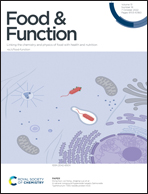Ellagic acid prevents gut damage via ameliorating microbe-associated intestinal lymphocyte imbalance
Abstract
Inflammatory bowel disease (IBD) pathogenesis involves a sustained microbial-mediated immune response following intestinal stress. Although administration of antibiotics can be an effective therapy, the misuse of antibiotics may risk unknown drug-resistant bacteria. In this study, piglets pretreated with ellagic acid (EA) and Ampicillin (AMP) for 21 days, and were injected intraperitoneally with paraquat (PQ) on 14 and 18 days. We found piglets lost most of their gut microbes in the AMP group, protected from subsequent intestinal damage caused by gut oxidative stress. Hence, we identified some gut microbes that may play a critical role in mediating cellular responses following cytokine stimulation in PQ-induced stress. EA preprocessing exhibited the same performance as AMP. Pretreatment of EA reduced Streptococcus abundance in the gut. Particularly, EA modulated intestinal lymphocyte distribution, reduced the frequency of CD79a+ cells, and alleviated the upward migration of CD3+ cells to the apex of the intestinal villi in the intestinal epithelium. Additionally, the intestinal immune response had been known associated closely with the abundance of Streptococcus in the gut. Thus, we concluded that EA has the potential to replace antibiotics to prevent microbial-mediated immune responses in the gut, and EA can be applied as a supplement candidate to alleviate the development of inflammation caused by intestinal stress.



 Please wait while we load your content...
Please wait while we load your content...